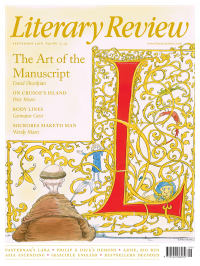Richard Overy
The Guns of November
The Vanquished: Why the First World War Failed to End, 1917–1923
By Robert Gerwarth
Allen Lane 446pp £25
Armistice Day is embedded in popular Western memory of the Great War – the moment in 1918 when the guns stopped firing on the Western Front. Every 11 November, two minutes’ silence is observed across the United Kingdom, perpetuating awareness of that sombre moment. What the armistice actually meant is seldom examined very closely; it is enough that the seemingly remorseless killing in the trenches of France and Belgium ended. In reality, that was all that stopped on 11 November 1918. The end of the Great War was as confused and messy as its start. It took four more years of conflict across much of central and eastern Europe and the eastern Mediterranean before a peace settlement of sorts was reached. Even the armistice settled little: the economic blockade of Germany by the Allies went on until the Weimar Republic accepted the terms of the Treaty of Versailles in June 1919.
Those messy years are the subject of Robert Gerwarth’s searing and vivid new account of the violent birth of a new Europe in the five years after 1918. He makes the obvious and sensible point that it was defeat and its aftermath, rather than the conflict itself, that prompted the

Sign Up to our newsletter
Receive free articles, highlights from the archive, news, details of prizes, and much more.@Lit_Review
Follow Literary Review on Twitter
Twitter Feed
In 1524, hundreds of thousands of peasants across Germany took up arms against their social superiors.
Peter Marshall investigates the causes and consequences of the German Peasants’ War, the largest uprising in Europe before the French Revolution.
Peter Marshall - Down with the Ox Tax!
Peter Marshall: Down with the Ox Tax! - Summer of Fire and Blood: The German Peasants’ War by Lyndal Roper
literaryreview.co.uk
The Soviet double agent Oleg Gordievsky, who died yesterday, reviewed many books on Russia & spying for our pages. As he lived under threat of assassination, books had to be sent to him under ever-changing pseudonyms. Here are a selection of his pieces:
Literary Review - For People Who Devour Books
Book reviews by Oleg Gordievsky
literaryreview.co.uk
The Soviet Union might seem the last place that the art duo Gilbert & George would achieve success. Yet as the communist regime collapsed, that’s precisely what happened.
@StephenSmithWDS wonders how two East End gadflies infiltrated the Eastern Bloc.
Stephen Smith - From Russia with Lucre
Stephen Smith: From Russia with Lucre - Gilbert & George and the Communists by James Birch
literaryreview.co.uk